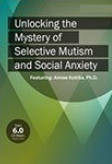Aimee Kotrba – Unlocking the Mystery of Selective Mutism and Social Anxiety
$200 Original price was: $200.$75Current price is: $75.
Shopping Instructions:
- DISCOUNT 15% : SHOP15
- Product Delivery: Within 1 – 12 hours after purchase.
Aimee Kotrba, Ph.D., uses interactive discussions and humor through stories and anecdotes to describe the process of treatment and her years of experience working with children with selective mutism.
Aimee Kotrba – Unlocking the Mystery of Selective Mutism and Social Anxiety
- Build assessment-based treatment plans that work
- Master practical, easy-to-implement techniques for increasing communication
- Design a specific, individualized treatment plan
- Develop successful accommodations for the school setting
- Differentiate selective mutism from autism or defiance
The abilities to communicate needs, socialize, work in groups, and make friends are desperately needed to succeed in elementary school and beyond. Children with untreated selective mutism are at an increased risk for self-esteem issues, depression, school failure, social skill problems, and school refusal. Early and evidence-based therapeutic intervention is of the upmost importance to decrease anxiety and increase communication in children with selective mutism. Through the use of case studies and video examples, you will learn how to identify and assess for selective mutism and what school and mental health professionals can do to help. Interventions are broken down into small, easily understood steps that you can immediately use with patients or students. You will practice role-plays to learn practical techniques for increasing speech and helping children control their anxiety.
Aimee Kotrba, Ph.D., uses interactive discussions and humor through stories and anecdotes to describe the process of treatment and her years of experience working with children with selective mutism. Discover useful ways to intervene with even the most difficult cases. Leave not only with a specific, successful treatment plan for your individual cases but also with the knowledge to teach others in your workplace or community about selective mutism.
- Appropriately assess for selective mutism using established criteria, questionnaires and observation.
- Design an effective treatment plan utilizing assessment outcomes.
- List four coexisting problems/diagnoses that will likely impact treatment outcome.
- Explain the negative reinforcement loop.
- Create a graded exposure hierarchy based on communication (verbal and nonverbal).
- Practice four practical techniques for reducing anxiety and increasing communication.
Would you like to receive Aimee Kotrba – Unlocking the Mystery of Selective Mutism and Social Anxiety ?
Assessment and Diagnosis
- Development of Selective Mutism/Social Anxiety
- Coexisting/Complicating Problems
- Academic and Social Implications
- School and Clinic-based assessment for Selective Mutism
Behavioral Intervention
- Exposure, Shaping, Stimulus Fading
- How to Build an Anxiety Hierarchy
- Individualize the Treatment for Your Client/Student
- Develop an Effective Reinforcement System
- Relaxation Training
- Can Kids “Think” Their Way Braver
- Cognitive Techniques That Work
- Does Medication Really Help?
School Implementation
- How to Interact with Anxious Children in the School Setting
- IEP or Section 504? Develop a Special Education Plan
- Academic Goals and Specific School Interventions
- Generalizing Communication in the “Real World
Related products
NLP & Hypnosis
NLP & Hypnosis
NLP & Hypnosis
Joseph Cohen – The SelfHacked Secrets To Understanding Why You Are Sick And How To Get Well
NLP & Hypnosis
NLP & Hypnosis
NLP & Hypnosis
NLP & Hypnosis












